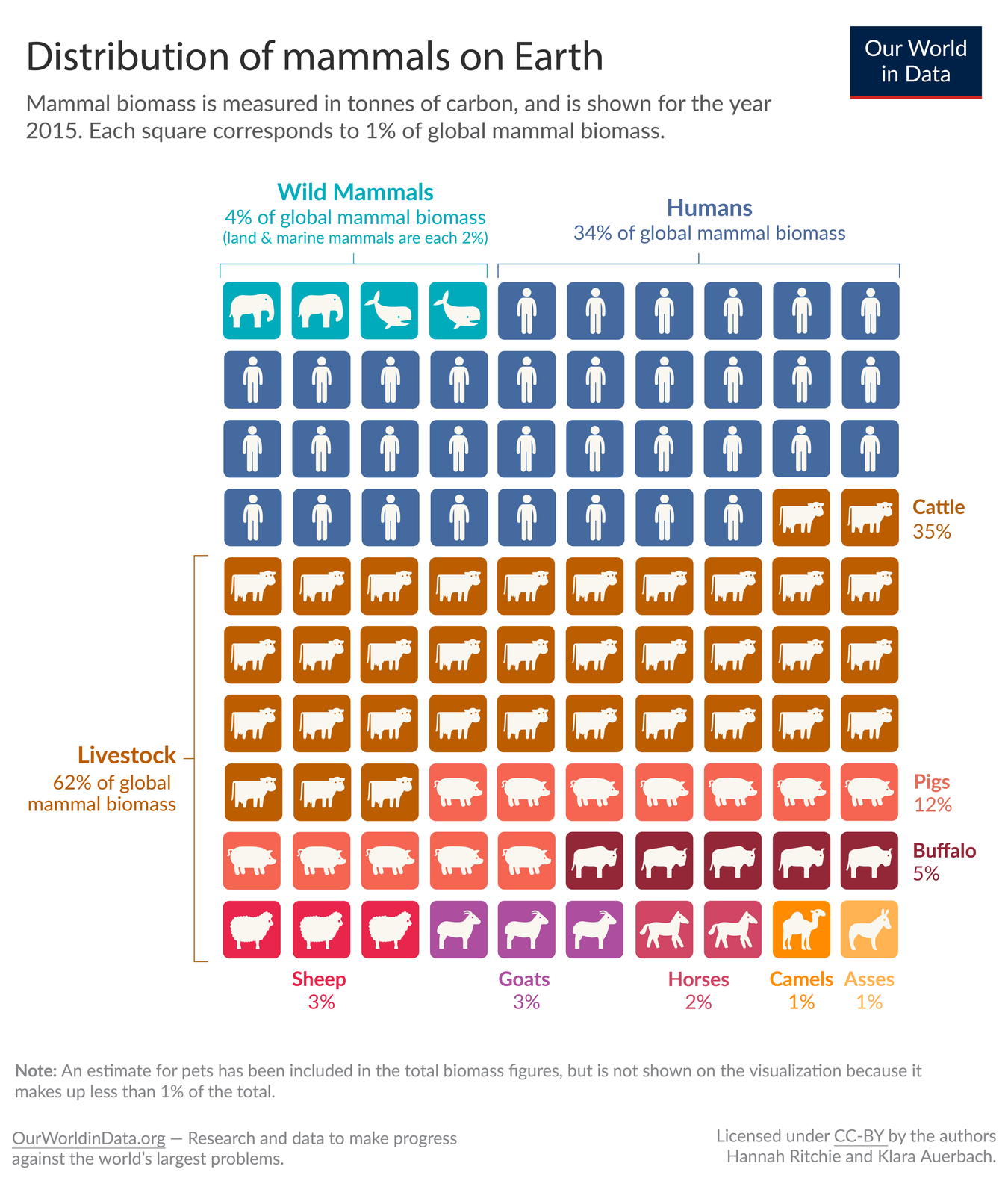- cross-posted to:
- solarpunk@slrpnk.net
- cross-posted to:
- solarpunk@slrpnk.net
I’m so dopey. I thought this was suggesting that we’d invented up with some clever formulation to stop bugs sticking to windshields in 2020 and that we’d all have fully autonomous cars by 2050.
There ARE fewer bugs, and that’s a problem, but also cars are more aerodynamic and would kill fewer bugs these days regardless.
Hmmm… This article suggests the opposite.
What is it about then 0_o ?
It is about how the death of the insects is a precursor to the death of the rest of us. In the 90’s, there were a lot more bugs in the world, and it was very noticeable on road trips. They’re all gone now.
I was outside, next to a park on a lake, and I mentioned to someone the lack of ambient bugs. He was insistent that there were bugs around somewhere but it took me several minutes to locate ONE and it was the only one I could find.
No dragonflies, ladybugs, bees, wasps, butterflies, beetles, grasshoppers… I couldn’t even see any ants, flies, or mosquitos. The one I found looked similar to a gnat. It’s spring here. There should be bugs.
I don’t know where all of you live, but my windshield is still an aria of death in the spring of 2024.
It is probably because newer cars are more aerodynamic and the bugs just fly over

That’s a very small part of it. Most of it is that we’re destroying our surrounding ecosystem with multiple different pressures.
Whoa, this is disconcerting. My folks used to run a rental car agency and I helped out every now and then by cleaning cars. I remember cleaning so many bugs off of cars 20ish years ago, and now on my own car - barely nothing. :(
200,050: a giant cockroach at the wheel.
We’re undoubtedly in the midst of another mass extinction, caused by human activity. Here’s another one that will freak you out:

There’s something wrong with this data.
The fraction of assess should be way higher.
TIL there are animals called Ass
Mammal biomass is 1% ass
And yeah, they’re donkeys. We have wild donkeys where I live, they’re feral asses
Isn’t it just another word for donkey?
This makes no sense… It says pets aren’t included.
There are 500-700 million dogs worldwide. There are only just under 59 million horses.
I don’t believe any of this as a result.
Edit: and 35 million camels
700 million dogs x 17 kg per dog = 12 Mt of dog
59 million horses x 700 kg per horse = 41 Mt of horse
If horses are 2%, then dogs are 0.5%, less than 1% just like they said
35 million camels x 500 kg per camel = 17 Mt of camel, a little less than 1%
I think the key thing is they’re measuring biomass, not just the number of animals, otherwise it would all be stuff like mice and rats (not to say that wouldn’t be a valid thing to look at also)
BioMASS is not about the number of animals but about their mass. Sure there’s a lot of dogs and cats but they don’t weigh as much as a camel.
And that’s only because whales and elephants are so massive.
Presumably subway rats and other vermin count as wild?
and how is that relevant to what I said?
How isn’t it relevant? Large animals like whales make up a disproportionate amount of ‘wild animal’ biomass. But rats, mice etc will make up a sizeable proportion too while being human centric pests in much of the world.
4% is actually worse than it looks.
It doesn’t help that we chose the meatiest animals to keep as livestock and then made sure they got even fatter than they started by any means necessary. One factory farmed cow probably weighs like 12 wild deer and a few wild rabbits for good measure.
Why is that supposed to freak me out? We cultivate animals for consumption and there’s not a 1:1 absorption/usage ratio. Now add insect biomass.
Don’t worry guys, the billionaires already built their bunkers and their space ships! Just as planned.
There is no cow level.
Asses?
Ass = Donkey
Arse = Butt
Yo Brit donkey
Fits on a graph better than “Donkeys” I suppose.
Here’s a fun one about the fish:

You can see where they decided “Profit, with no consideration of anything else!” was the answer
I’m going to guess it wasn’t a decision, so much as tech availability and pricing. radar, sonar, more powerful boats with bigger trawl nets.
If they’d had that stuff earlier it’d be the same tragedy of the same commons.
Fair.
If we could’ve fucked things over a decade ago, we definitely would’ve!
That is not fun. That is the opposite of fun 🤕
😢
This is kind of misleading since they closed the fishery (I think in the 90s), so the amount of cod catch would naturally plummet. The fishery did, however, need to be closed due to overfishing.
Not exactly; it collapsed, then they closed it once it was too late, and now it’s still fucked, 30 years later.
In the early-1990s, the industry collapsed entirely.
In 1992, John Crosbie, the Minister of Fisheries and Oceans, set the quota for cod at 187,969 tonnes, even though only 129,033 tonnes had been caught the previous year.
In 1992 the government announced a moratorium on cod fishing.[12] The moratorium was at first meant to last two years, hoping that the northern cod population would recover and the fishery. However, catches were still low,[16] and thus the cod fishery remained closed.
By 1993 six cod populations had collapsed, forcing a belated moratorium on fishing.[14] Spawning biomass had decreased by at least 75% in all stocks, by 90% in three of the six stocks, and by 99% in the case of “northern” cod, previously the largest cod fishery in the world.[14] The previous increases in catches were wrongly thought to be due to “the stock growing” but were caused by new technologies such as trawlers.[13]
That’s a fair point. It still is a misleading plot since it isn’t an estimate cod population, and isn’t representative of population after 1992. As you said the numbers are still bleak. I found this plot
 , Source , which does tell a similar story around the early 90s but indicates greater recovery in more recent years.
, Source , which does tell a similar story around the early 90s but indicates greater recovery in more recent years.Fuck. Fish near China, India and Indonesia are doomed
Dude. This is loaded as fuck misinformation and you should be ashamed of yourself.
Cod fishing on Canada’s eastern coastal area has been banned since 1992. That’s why it’s flattened out to nothing all of a sudden. They stopped Cod fishing there.
Cod fishing on Canada’s eastern coastal waters was halted in 1992 for two years, with the plan being that the population would recover and they could start fishing again. Did you think the population recovered and they just decided not to start fishing again because they forgot? Or that they just had woken up one day and decided to take the drastic step of banning fishing and throwing 30,000 people out of work and destroying one of their thriving industries because nothing had happened to the fish?
The collapse happened before the ban, not after. And they took long enough to notice and implement it that the fishery was driven to total, semi-permanent collapse before the ban, to an extent that they didn’t fully realize until several years had gone by and the fish still hadn’t recovered.
Here’s a pretty detailed summary of the before and after. In 2005, after 13 years of the ban, the cod biomass off Canada’s coast was still about 3% of its pre-industrial-fishing levels. That’s why there’s still a ban: Not that they just hate sending out boats and bringing in fish, but that the population’s still fucked and not really recovering, and so any fishing would be simply giving some additional cleaver-whacks to the already dead golden goose. I don’t know what the numbers are now, but I would be surprised if they are dramatically better, and I think the chart I cited is an extremely honest and vivid picture of the results of overfishing, and not loaded or anything else as-fuck.
Pest control is a trillion dollar industry
Gaia does it for free if you just wait long enough,
Aint none of us got that much time
… well, yeah.
Cuz we’re the pests…
Stop cutting your lawns and dig a pond. It’s not going to stop industrial scale destruction, but it’s something actionable that you can do yourself and see the positive impact right at home. If enough homes do it, a network of gardens can become a macro system.
Idk my artificial monoculture of non-native grasses kept immaculately trimmed and racially pure with toxic chemicals applied regularly makes me feel better than my neighbors’ artificial monoculture of non-native grasses kept immaculately trimmed and racially pure with toxic chemicals applied regularly.
That is how my daddy did it and that is how his daddy did it and their generations haven’t set any cultural precedents that have been incredibly predictably devastating to life and the biosphere as far as I can tell in these recordbreakingly hot and insect free times. I mean sure, those other places are experiencing historic climate events, but that is just part of normal climate cycles that haven’t existed in millennia.
Bro would probably be more than 70 years old in 2050, good that he’s off the streets
Not quite correct. The 2020 image should have a car completely covered in a dust of green pollen because city planners only planted male trees for decades because female trees would produce fruit or seed and be a “nuisance” and/or create trash/animal bait etc…
But if they only planted female trees, they would never get fertilized, so they wouldn’t produce fruit anyway… Or pollen.
Worst case scenario, they would produce fruit, and cities would still smell bad and have rodent problems. But without the allergies.
Oh I remember 2 years ago where I live there was so much fucking pollen. And we had no rain for like 2 months so the streets were yellow with it. I am not allergic to pollen and yet I was constantly sneezing and my eyes were irritated. It was such a relief when we finally had some rain to clear everything.
When I was a kid, there used to be hundreds of fireflies in my backyard in the summer. Now, I get excited to see even two or three.
I blame the anti-mosquito pesticide services half my neighbors seem to hire.
Where I grew up, the city wanted to hire a bunch of trucks to drive around town spraying malathion into the air to kill the mosquitos. They had a vote, and the town voted overwhelmingly that, fuck no they did not want that, please don’t do that, that sounds awful. Then they did it anyway.
Same thing; now there are pretty much 0 fireflies.
Why did they even have a vote then? They just hoped everyone would say yes?
Who the fuck knows
(Not me 😕)
Blame the raking of the leaves. No leaves in fall means no place for the eggs to be laid and no place for the larvae to grow. It’s another casualty to grass lawns. A “clean” nature is a place where nothing has room to thrive.
I try to help what little I can there by not raking (or if I do, I collect and move into our fenced in section so insects can still make use of them). It does also help my laziness that I have a legitimate reason to not rake.
Not sure if it helps or not since I do mow the leaves with the grass at the start of the summer.
I’m [emotionally*] ready for the hyper-industrialized moon-scape our planet will become once our environment completely collapses. I think there will be a point past which any environmental protection measures will be useless because there’s nothing left to protect so industrial landscapes will become the norm.
industrial landscapes need a base of natural resources and less developed regions with high birth rates (as a source of labor) to support them.
I wonder if the insects have just learned to avoid highways, is there any data to indicate a shift in behavior like that? I couldn’t find anything
Yeah the data indicates we’ve killed so many they haven’t been able to repopulate fast enough.
They’re not avoiding the roads there’s just not as many bugs flying around anymore
Interesting, there are also reports like this so maybe it differs by region?https://www.nature.com/articles/s41559-020-1269-4
Could also vary by ecosystem, https://www.science.org/doi/10.1126/science.aax9931
I agree that humans are creating irreversible environmental changes though, I just hate the simplicity of science memes sometimes because it all just starts to sound like dogma
I mean realistically we’ve done/are doing irreparable damage either way.
Regardless of the region we’re causing massive population drops among pretty much every species.
It’s a very funny commentary on how we’re all about to die!
Why didn’t the scientists warn us that pollution was bad? Where were the scientists lighting themselves on fire in protest?
This is all science’s fault!
I’m 51, I spent the 90’s in Louisiana, and since my wife doesn’t fly, we have driven across the USA more times than we can count. In the 90’s, if you didn’t have a bug screen on your grill, the LoveBugs would clog your radiator and you would over heat. You also needed the windshield scrib and squeegee to scrub off the bug splatter every time you filled up. Now, you don’t need either of them.
Drove a ton in the 90s all across the US as well every year there was a couple several thousand mile vacations starting from near Kansas city.
The bugs were bad, but we never needed a bug screen on the grill. I never even remember seeing something like that exist, actually. Definitely less bugs now, though.
Lucky. I-10 could get ridiculous between the black cricket things, the love bugs, the dragon flies, etc.
Same age. Dad taught me to always clean the windshield when we filled up. Yeah.
Same in Europe.
I have been thinking about this recently. How much of this is lack of bugs vs aerodynamics. I mean back in the day we all drove big rectangles. I’m not denying the fact that it could be a mass extinction of bugs. Just curious.
Nope, seems to purely be the mass extinction thing. In fact:
modern cars hit more bugs, perhaps because older models push a bigger layer of air – and insects – over the vehicle.
My parents never gave me money unless I worked for it and washing their cars was one of those few things they did pay me to do. I remember always having to scrub bugs off the front, it was the hardest part. I’ve literally never washed my road cars because its just dust.
My parents never gave me money unless I worked for it
my road cars because its just dust.
I’m sorry. I legitimately can’t tell if this is satire or not…
What are you confused about? Some cars I’ve owned cannot go off road, maybe a bumpy dirt road here and there. Other cars I have owned I bought specifically because I needed them to go where there isn’t pavement or even a road. They get a lot dirtier and need cleaning just to stay functional.
Well, It sounded like you had more than a few cars, like currently. Which I found in stark contrast to the rest. Now i’m not confused, thanks!
I asked you a pertty clear question and you didn’t responsible to nmy point I’m trying or you exemplify to make If you’re ever willing to actually talk go ahead and DM me since your public views do nothing for you. Cum = upvotes. Hhhhhhhggghhh gonna cum.
Loked lolyes Daddy
👀
Do you need medical attention…?
Testicles diarrhea
Well this took a sharp turn
Damn, it got deleted. What did it say? Lol
"I asked you a pertty clear question and you didn’t responsible to nmy point I’m trying or you exemplify to make If you’re ever willing to actually talk go ahead and DM me since your public views do nothing for you. Cum = upvotes. Hhhhhhhggghhh gonna cum.
Loked lolyes Daddy"
-GluWu
This has bothered me for years. It’s a really strange thing to be telling younger relatives about how you legitimately could not drive any substantial distance without windshield cleaner at certain times of year. I remember them being plastered across the front edge of the hood and against the radiator after a long trip.
It’s one of the most visibly different things about the world today, IMO, and it’s a little eerie.
I remember the wasps always buzzing around the vehicle grills munching on all the dead bugs too. Now it’s just shiny and chrome.
I still remember 10 years ago when I was driving on the Autobahn at 130 km/h and a juicy bug hit the windshield. It was literally a loud splat. Besides the grill always being covered in bugs.
Hasn’t happened since, nowadays I can count the number of bugs on the grill with one hand. And that’s after months of driving.
The sounds, too.
I was talking with my dad walking near to a place that had frogs croaking, and he got a little emotional and excited to hear them over the phone. Normally it’s just traffic noises now, and silence.






















